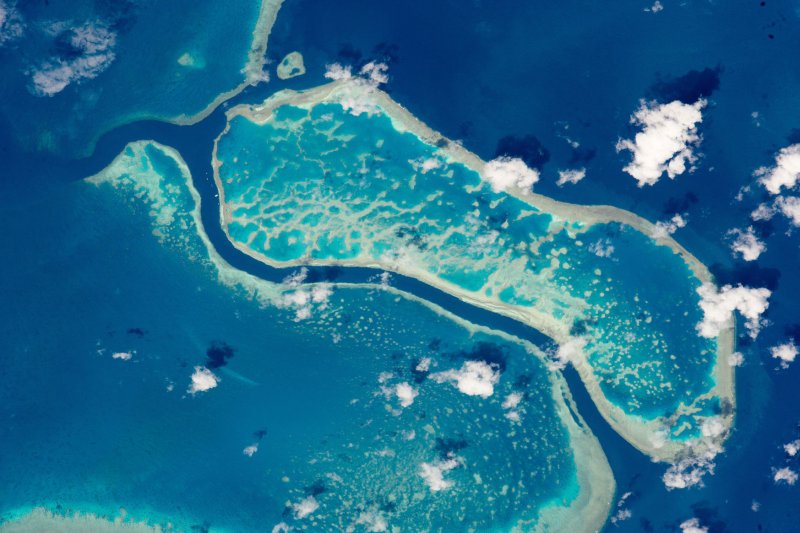Rat infestations reduce bird populations on many small islands. New research suggests the problem can harm the health of nearby coral reefs, too. Photo by NASA/UPI |
License Photo
July 13 (UPI) -- Rats have a surprising impact on the health of reefs. The invasive rodents not only disrupt online ecosystems, but harm surrounding marine ecosystems, too.
The unique link between rats and coral health was revealed by a survey of islands in the Chagos Archipelago. Soil analysis helped explain the correlation.
The most obvious impact of invasive rats is only island bird populations. Seabirds on many islands haven't evolved defenses against land predators. When invasive predators, like rodents, show up, they can gorge themselves on bird eggs and newborn chicks, decimating local populations.
When scientists analyzed the soil on islands with invasive rat populations, they realized the rodents are responsible for a cascade of ecological effects -- a reduced bird population was just the first domino.
"Seabirds are crucial to these kinds of islands because they are able to fly to highly productive areas of open ocean to feed," Nick Graham, an ecologist at Lancaster University, said in a news release. "They then return to their island homes where they roost and breed, depositing guano -- or bird droppings -- on the soil. This guano is rich in the nutrients, nitrogen and phosphorus."
The soil analysis helped explain why scientists found diminished coral health near islands with rat infestations. The nutrients provided by bat guano are essential to healthy reef ecosystems.
"Until now, we didn't know to what extent this made a difference to adjacent coral reefs," Graham said.
The nutrients don't necessarily fuel coral growth or improve coral health directly. But they are essential to a variety of biological processes that promote healthy coral. For example, nitrogen fuels microalgae growth, which feeds macroalgae, filter-feeding sponges, turf algae and fish. Fish, sponges and other species graze on dead coral, which promotes new coral growth.
Scientists found reefs around islands without rats hosted 50 percent more fish biomass and more than three times as much grazing activity as reefs near rat-infested islands.
For coral, which face a variety of environmental threats, every bit of assistance they can get helps. Coral which are more frequently grazed, promoting new growth, are likely to be better equipped to survive other environmental pressures.
"The results of this study are clear. Rat eradication should be a high conservation priority on oceanic islands," Graham said. "Getting rid of the rats would be likely to benefit terrestrial ecosystems and enhance coral reef productivity and functioning by restoring seabird derived nutrient subsidies from large areas of ocean. It could tip the balance for the future survival of these reefs and their ecosystems."
Graham and his colleagues shared their study this week in the journal Nature.















